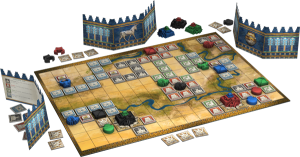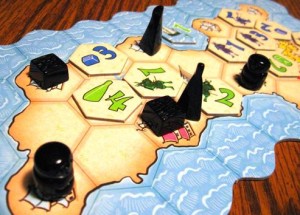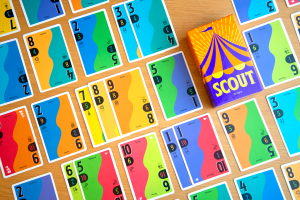
A way designers try to create tension in a board game is to force a player to divide his attention, usually by offering several sources of points. The idea is you can’t just do one of the things to win, you should be thinking about all of the ways to get points. In most current board games a player can mostly focus on one thing, only dabble at the other stuff, and still get away with it.
Reiner Knizia is having none of that. You will be divided. You will be torn. You will suffer making these decisions. Suffer deliciously. Here’s a quick look a two of my favourite Knizias to see how he splits your gameplay and focus. It’s a lot more interesting than “I’ll pay 4 to go up on the god track too”.
Tigris and Euphrates – Score the Worst
Different sources of points in the game have different colours. When you get a point, it comes in that colour. At the end of the game, the colour you have the least in is your final score. You can have 25 kabajillion blue points, but if you have only 2 red points, your final score is 2. T&E forces you to really think about the other colours and truly divides your attention. Yeah, you figure Johnny’s only a point or two behind you on green and catching up, but you have to do something about your blue points or you might end the game without any points at all. So you let Johnny have it and hope he forgets about his red…
Samurai – Most Mosts
Samurai is another Knizia game with different kinds of points: rice, nobles, and buddhas. At the end of the game, you compare everyone’s scored tokens. If you have the most of a particular kind you’re one step towards victory, but not quite there. To win the game, you have to win “the most” for more kinds of tokens than anyone else. Since there are only 3 kinds of points and only around 20 pieces total to be fought over, these are super-tight, razor-close victories. Only dabbling in another kind of scoring token doesn’t help you: you have to win the most for it to count. Samurai does give an observant player a new option: screw up your opponents. You can burn points other players have stakes in. You can score points for other players so that they tie on points of that type; a tie is not the most, it’s a tie.
Del







